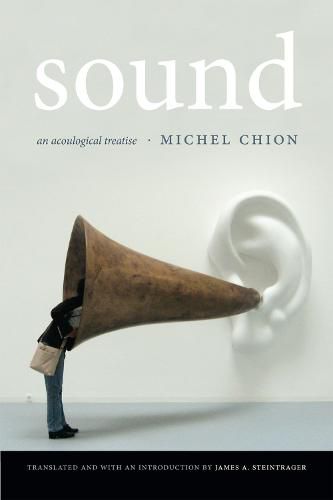Readings Newsletter
Become a Readings Member to make your shopping experience even easier.
Sign in or sign up for free!
You’re not far away from qualifying for FREE standard shipping within Australia
You’ve qualified for FREE standard shipping within Australia
The cart is loading…






First published in French in 1998, revised in 2010, and appearing here in English for the first time, Michel Chion’s Sound addresses the philosophical, interpretive, and practical questions that inform our encounters with sound. Chion considers how cultural institutions privilege some sounds above others and how spurious distinctions between noise and sound guide the ways we hear and value certain sounds. He critiques the tenacious tendency to understand sounds in relation to their sources and advocates acousmatic listening-listening without visual access to a sound’s cause-to disentangle ourselves from auditory habits and prejudices. Yet sound can no more be reduced to mere perceptual phenomena than encapsulated in the sciences of acoustics and physiology. As Chion reminds us and explores in depth, a wide range of linguistic, sensory, cultural, institutional, and media- and technologically-specific factors interact with and shape sonic experiences. Interrogating these interactions, Chion stimulates us to think about how we might open our ears to new sounds, become more nuanced and informed listeners, and more fully understand the links between how we hear and what we do.
$9.00 standard shipping within Australia
FREE standard shipping within Australia for orders over $100.00
Express & International shipping calculated at checkout
First published in French in 1998, revised in 2010, and appearing here in English for the first time, Michel Chion’s Sound addresses the philosophical, interpretive, and practical questions that inform our encounters with sound. Chion considers how cultural institutions privilege some sounds above others and how spurious distinctions between noise and sound guide the ways we hear and value certain sounds. He critiques the tenacious tendency to understand sounds in relation to their sources and advocates acousmatic listening-listening without visual access to a sound’s cause-to disentangle ourselves from auditory habits and prejudices. Yet sound can no more be reduced to mere perceptual phenomena than encapsulated in the sciences of acoustics and physiology. As Chion reminds us and explores in depth, a wide range of linguistic, sensory, cultural, institutional, and media- and technologically-specific factors interact with and shape sonic experiences. Interrogating these interactions, Chion stimulates us to think about how we might open our ears to new sounds, become more nuanced and informed listeners, and more fully understand the links between how we hear and what we do.